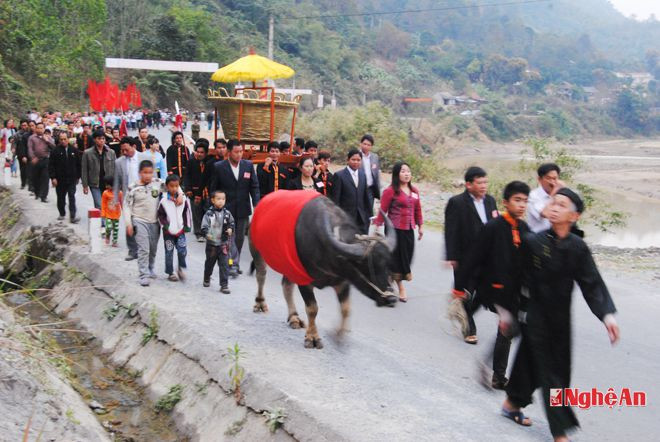The Legend of Ba Gia Mountain
(Baonghean) - Ba Gia Mountain is located in Na Luong village, connecting with the overlapping mountain ranges of the Nghe borderland. At the foot of the mountain is the winding Nam Mo River and National Highway 7A runs along the right bank of this poetic river. Na Luong village seems to embrace the slopes of Ba Gia Mountain to create a green, fertile look. The mountain is like a surrounding wall, protecting the village to always be peaceful, never being destroyed by storms, floods, or hurricanes.
 |
| Procession of 9-handle cauldron at Pu Nha Thau Temple Festival. |
All the people of Na Luong know the legend of Ba Gia Mountain by heart, even children as young as 6 or 7 years old. According to the legend being passed down, in the 14th century, the Ky Son border was still deserted, the villages were sparse, and life was full of hardships and difficulties. Taking advantage of this, the bandits from the other side of the border flooded in to encroach and plunder. They tried to burn down villages, kill innocent people, and take all the corn, rice, buffaloes, and cows. Our people were extremely angry and tried to fight back, but the bandits relied on their large numbers and were extremely brutal, so they had to flee into the wild forests and deep mountains. At the most critical moment, fortunately, the Tran Dynasty sent troops to the border to repel the bandits, bringing a peaceful life to the people. The royal army led by Admiral Doan Nhu Hai advanced to Phu Tuong area, calling on local people to join the insurgents and help by supporting food supplies. In response to the call of the Tran Dynasty general, the ethnic people here actively responded and asked to join the ranks of the insurgent army to drive the enemy out of the country.
General Doan Nhu Hai chose a fairly high mountain in Na Luong village as a base to gather military provisions and train soldiers day and night. From here, it was easy to observe the surrounding areas and monitor the movements of the enemy troops to promptly come up with countermeasures. The people of Na Luong always ensured the supply source so that the insurgents could practice martial arts and fight off the enemy. Among them, there was an old woman who was old but still encouraged her husband and children to join the insurgents to soon bring peace to the village. She herself took on the task of collecting rice to feed the soldiers. Every day, she went to each house to collect donations, and the collected rice was put into a 9-handled cauldron to cook into rice and divided equally among all the soldiers. She did this persistently and patiently, regardless of day or night, rain or shine, as long as the soldiers were well fed.
In a fierce battle, General Doan Nhu Hai sacrificed his life, the husband and son of the old man who raised the troops were also killed. Later, when the border was cleared of invaders and the country returned to peace, the people of Na Luong built a temple on the mountain to commemorate the merits of the General of the Tran Dynasty, and the temple was called Tran Temple. Some time later, the old mother who raised the troops also passed away, her merits were remembered by everyone and her spirit tablet was also worshiped at Tran Temple. And that mountain was called Ba Gia Mountain (Pu Nha Thau) by the people. Over time, the name of the old man who raised the troops may no longer be remembered, but her silent sacrifice and merits to the country are always engraved. She is the embodiment of patriotism, love for her people and the steadfastness of Vietnamese women.
After hundreds of years, Tran Temple still exists on the mountain top with the name Pu Nha Thau Temple. The temple is cared for with incense all year round and annually holds a ceremony in early Spring. On the ceremony day, in addition to the spirit tablet and sacrificial objects, the procession also carries a 9-handled cauldron from Na Luong village to the temple yard to perform the ceremony. That is the way to remind generations to always remember the merit of the old mother who raised the army and build pride in the tradition of the homeland.
Cong Kien






